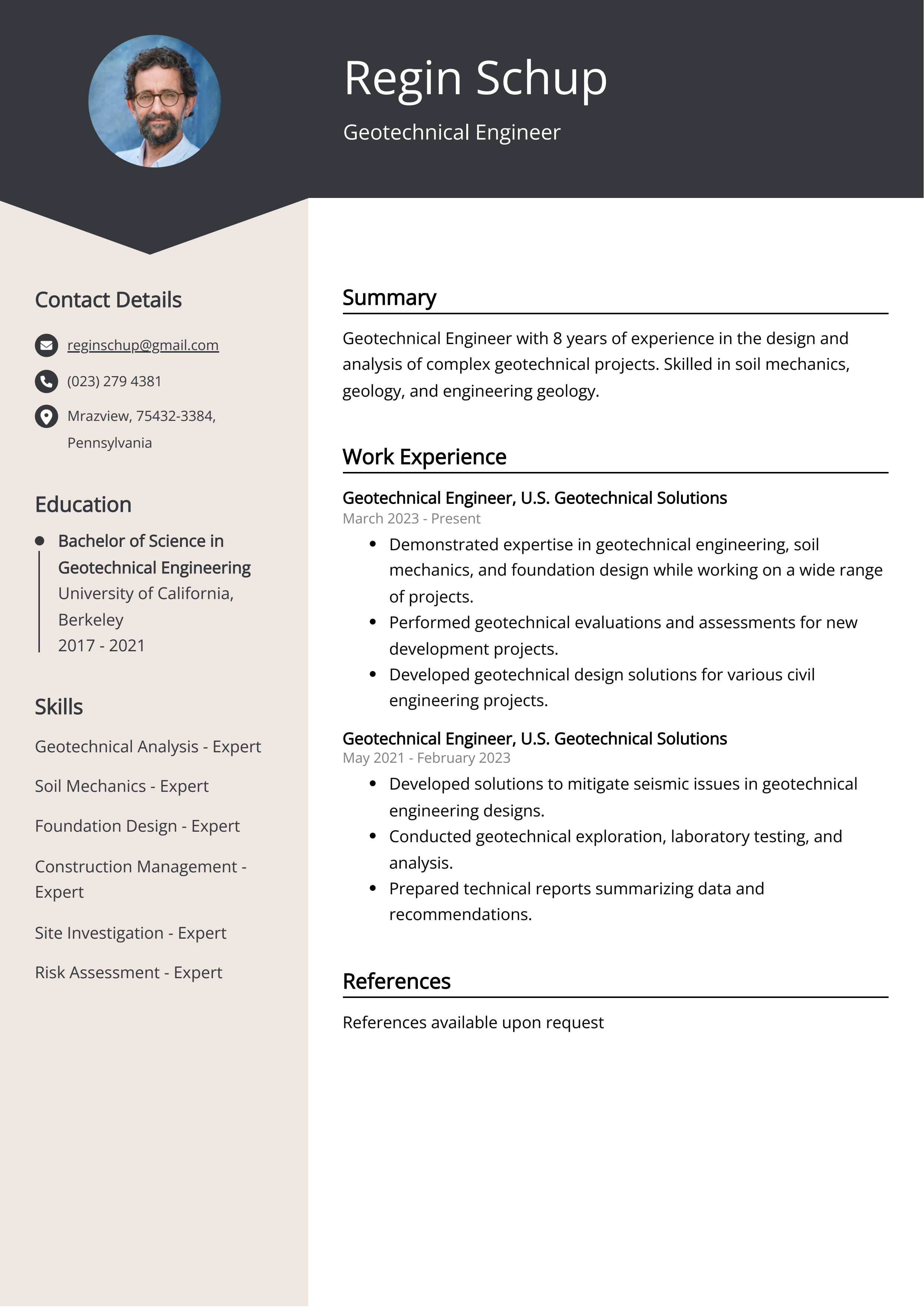Little Known Facts About Geotheta.
Little Known Facts About Geotheta.
Blog Article
6 Simple Techniques For Geotheta
Table of ContentsGetting My Geotheta To WorkThe Of GeothetaGeotheta Fundamentals ExplainedGeotheta Fundamentals ExplainedAll about Geotheta

They carry out website investigations, collect samples, do research laboratory tests, and analyze data to examine the viability of the ground for building jobs - Consulting Engineers. Based on their findings, geotechnical designers give suggestions for foundation style, incline stability, maintaining frameworks, and reduction of geotechnical hazards. They collaborate with other experts, such as engineers, architectural engineers, and building and construction groups, to make sure that geotechnical factors to consider are integrated into the overall job layout and implementation
By evaluating the actions and residential or commercial properties of dirt and rock, they can determine potential geotechnical threats such as landslides, dirt negotiation, or incline instability. Their experience helps avoid failings or mishaps that can threaten lives and building. Right here are some thorough responsibilities and duties of a geotechnical designer: Site Investigation: Geotechnical designers conduct website examinations to collect information on subsurface problems.
They interpret the data to recognize the buildings and habits of the dirt and rock, including their strength, permeability, compaction characteristics, and groundwater problems. Geotechnical Evaluation and Design: Geotechnical engineers analyze the information accumulated throughout site investigations to analyze the security and viability of the site for building and construction tasks. They execute geotechnical calculations and modeling to evaluate elements such as birthing capability, settlement, incline security, side planet pressures, and groundwater flow.
Excitement About Geotheta
Foundation Design: Geotechnical designers play a critical duty in making foundations that can securely sustain the desired structure. They analyze the dirt problems and tons demands to establish the proper foundation kind, such as superficial structures (e.g., footings), deep foundations (e.g (https://www.find-us-here.com/businesses/Geotheta-Alexandria-Alabama-USA/34113488/)., stacks), or specialized methods like soil enhancement. They think about variables such as negotiation restrictions, bearing ability, and soil-structure interaction to establish optimal foundation styles
They evaluate building and construction plans, display website tasks, and perform area inspections to confirm that the layout recommendations are complied with. If unexpected geotechnical concerns arise, they assess the circumstance and offer recommendations for remediation or adjustments to the layout. Risk Assessment and Reduction: Geotechnical designers evaluate geotechnical risks and dangers linked with the job site, such as landslides, liquefaction, or dirt disintegration.

Partnership and Interaction: Geotechnical designers function closely with other experts involved in a project, such as architects, structural designers, and building groups. Efficient communication and partnership are crucial to incorporate geotechnical factors to consider into the overall job style and construction procedure. Geotechnical designers supply technical experience, answer questions, and ensure that geotechnical needs are fulfilled.
Get This Report about Geotheta
Below are some sorts of geotechnical engineers: Foundation Engineer: Foundation engineers focus on making and evaluating structures for frameworks. They evaluate the soil conditions, lots needs, and website attributes to figure out one of the most suitable foundation kind and design, such as shallow structures, deep foundations, or specialized methods like pile structures.
They examine the aspects affecting slope stability, such as dirt residential properties, groundwater problems, and incline geometry, and develop strategies to stop slope failings and minimize dangers. Quake Engineer: Earthquake designers concentrate on analyzing and designing structures to endure seismic forces. They evaluate the seismic risk of a site, assess soil liquefaction potential, and create seismic style standards to make sure the safety and security and durability of structures during quakes.
They perform field screening, collect samples, and examine the collected data to identify the dirt homes, geologic formations, and groundwater conditions at a site. Geotechnical Instrumentation Designer: Geotechnical instrumentation designers concentrate on tracking and determining the behavior of soil, rock, and frameworks. They install and keep instrumentation systems that check aspects such as soil negotiation, groundwater levels, slope activities, and structural variations to assess efficiency and supply early cautions of prospective issues.
Not known Facts About Geotheta
They perform examinations such as triaxial examinations, consolidation examinations, direct shear tests, and permeability examinations to collect information for geotechnical evaluation and style. Geosynthetics Engineer: Geosynthetics designers focus on the design and application of geosynthetic products, such as geotextiles, geogrids, and geomembranes. They use these materials to boost soil stability, reinforce slopes, give water drainage services, and control erosion.
They have a tendency to be investigatory people, which suggests they're intellectual, reflective, and curious. They wonder, methodical, reasonable, logical, and sensible. Several of them are also social, meaning they're kind, charitable, cooperative, individual, caring, handy, compassionate, sensible, and friendly. Does this seem like you? Take our free career examination to locate out if geotechnical designer is just one of your leading career matches.
In the office atmosphere, geotechnical designers make use of specialized software application devices to carry out calculations, produce styles, and evaluate information. They prepare reports, evaluation task requirements, communicate with clients and staff member, and coordinate job tasks. The workplace setup gives a helpful setting for study, evaluation, and collaboration with other professionals associated with the project.
5 Simple Techniques For Geotheta
They regularly visit task sites to carry out site investigations, examine geotechnical conditions, and collect information for analysis. These gos to entail taking a trip to various places, sometimes in remote or difficult terrains. Geotechnical designers may execute soil tasting, conduct tests, and screen building and construction tasks to make sure that the geotechnical aspects of the project are being applied properly.
Geotechnical designers also operate in specialized geotechnical laboratories. In these facilities, they carry out experiments, do tests on soil and rock examples, and evaluate the design residential or commercial properties of the materials. Geotechnical laboratory engineers function extensively in these atmospheres, dealing with screening devices, running tools, and videotaping information. They team up with other lab team to ensure accurate and reputable testing outcomes.
Report this page